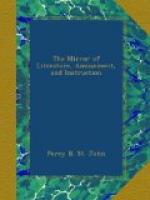A French geologist conceived that the sea covered the earth for a vast period; that all animals were originally inhabitants of the water; that their habits gradually changed on the retiring of the waves, and “that man himself began his career as a fish!”—Mag. Nat. Hist.
* * * * *
SPIRIT OF THE PUBLIC JOURNALS.
THE CLIFFORDS OF CRAVEN.
There is no district in England which abounds in more beautiful and romantic scenery than the remote and rarely visited district of Craven, in Yorkshire. Its long ridge of low and irregular hills, terminating at last in the enormous masses of Pennygent and Ingleborough,—its deep and secluded valleys, containing within their hoary ramparts of gray limestone fertile fields and pleasant pasturages,—its wide-spreading moors, covered with the different species of moss and ling, and fern and bent-grass, which variegate the brown livery of the heath, and break its sombre uniformity,—its crystal streams of unwearied rapidity, now winding a silent course “in infant pride” through the willows and sedges which fringe their banks, and now bounding with impetuous rage over the broken ledges of rock, which seek in vain to impede their progress from the mountains,—its indigenous woods of yew, and beech, and ash, and alder, which have waved in the winds of centuries, and which still flourish in green old age on the sides and summits of the smaller declivities,—its projecting crags, which fling additional gloom over the melancholy tarns that repose in dismal grandeur at their feet,—its hamlets, and towns, and ivy-mantled churches, which remind the visiter of their antiquity by the rudeness, and convince him of their durability by the massiveness of their construction,—these are all features in the landscape which require to be seen only once, to be impressed upon the recollection for ever. But it is not merely for the lovers of the wild, and beautiful, and picturesque, that the localities of Craven possess a powerful charm. The antiquarian, the novelist, and the poet, may all find rich store of employment in the traditions which are handed down from father to son respecting the ancient lords and inhabitants of the district. It is indeed the region of romance, and I have often felt surprise, that the interesting materials with which it abounds have so seldom been incorporated into the works of fiction which are now issuing with such thoughtless haste from the press of the metropolis. In Dr. Whitaker’s History of Craven—which in spite of his extravagant prejudices in favour of gentle blood, and in derogation of commercial opulence, is still an excellent model for all future writers of local history—there is a ground-work laid for at least a dozen ordinary novels. To say nothing of the legendary tales, which the peasantry relate of the minor families of the district, of the Bracewells, the Tempests, the Lysters, the Romilies,




